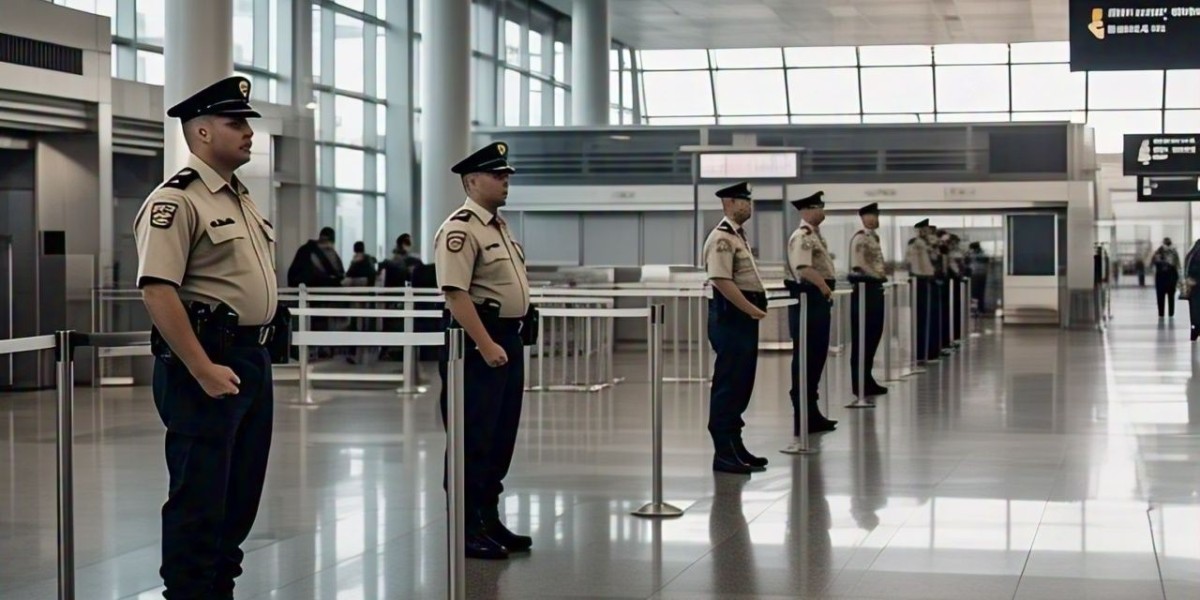Introduction: Why Security Guards Are Essential in Airports
Security guards play a vital role in maintaining safety at airports, which are high-traffic environments with a wide range of potential security risks. From preventing unauthorized access to responding to emergencies, their presence ensures smooth operations. Their diverse responsibilities include patrolling, monitoring security systems, and handling potentially dangerous situations. Airport security guards act as both a visible deterrent and a critical first line of defense against threats.
Maintaining Order in Crowded Spaces
Airports are bustling with passengers, staff, and vehicles, creating a potential breeding ground for chaos. Security guards are tasked with maintaining order in such crowded environments. They ensure that passengers follow rules and regulations, such as adhering to baggage allowances and staying in designated areas. They also manage queues at check-in and security checkpoints to avoid congestion, ensuring that all passengers can move efficiently through the airport.
Preventing Unauthorized Access
One of the key duties of security guards at airports is to prevent unauthorized access to restricted areas. Airports have numerous sensitive zones, including baggage handling areas, runways, and boarding gates. Security guards conduct thorough checks and monitor access points to ensure only authorized personnel enter these high-security areas. Their vigilance helps protect sensitive information and vital infrastructure, minimizing the risk of sabotage or theft.
Responding to Emergencies
In the event of an emergency, airport security guards are trained to respond quickly and effectively. Whether it's a medical emergency, a fire, or a security threat, security guards are equipped to handle situations swiftly. They coordinate with emergency services, direct passengers to safety, and ensure that the incident does not escalate. Their preparedness and prompt action often make the difference between containment and disaster.
Surveillance Systems and Technology
Modern airports rely heavily on advanced surveillance systems to monitor activity across large areas. Security guards are responsible for operating these systems, reviewing footage, and responding to any suspicious activities. Through surveillance, they can detect potential threats, such as suspicious behavior or unattended baggage. These systems complement physical patrols, ensuring that security is maintained 24/7.
Mobile Patrol Security: A Proactive Approach
One key service that enhances airport security is mobile patrol security. These trained professionals monitor vast airport grounds, including parking lots, terminal entrances, and other outdoor areas. By patrolling these areas on foot or in vehicles, they can identify risks that static guards may miss. Mobile patrols provide flexibility and allow guards to respond quickly to incidents in any part of the airport. The added coverage ensures a higher level of safety across the entire airport complex.
Learn more about mobile patrol security services offered by professionals in the field here.
Handling Potential Threats: Detection and Prevention
Security guards at airports are trained to spot potential threats before they escalate. They observe behaviors, monitor the arrival of suspicious individuals, and identify any red flags. Their role in early detection is essential to preventing terrorist activities, theft, or disturbances. By conducting thorough checks, including random baggage searches, they help prevent dangerous items from entering the airport, keeping passengers and staff safe.
The Importance of Collaboration with Law Enforcement
Security guards at airports often work in collaboration with local law enforcement and other security agencies. In cases of heightened security threats, they join forces with police officers, military personnel, and customs officials to ensure a unified and effective response. This teamwork is crucial during major events, large-scale emergencies, or heightened security alerts.
Training and Certifications for Security Guards
To handle the dynamic nature of airport security, guards undergo specialized training programs. These programs include crisis management, crowd control, legal knowledge, and emergency medical procedures. Additionally, security guards are often certified in specific security disciplines, ensuring they meet the required standards for airport operations. Their ongoing training helps them stay ahead of evolving security threats and maintain airport safety.
The Role of Customer Service in Security
While airport security guards are primarily responsible for safety, they also play a significant role in customer service. They often interact with passengers, answering questions, offering directions, and providing assistance during delays or emergencies. A friendly, approachable demeanor helps reduce anxiety and improves the overall experience for travelers. Good customer service helps build trust and cooperation between passengers and security personnel.
Ensuring Safe Baggage Handling
Baggage handling is one of the most critical tasks at an airport. Security guards are responsible for monitoring the handling of baggage to ensure that it is not tampered with. They check baggage handling systems, supervise baggage claim areas, and inspect luggage for prohibited items. These measures reduce the risk of dangerous objects entering the airport and help maintain a secure environment.
Preventing Theft and Vandalism
Security guards are often tasked with preventing theft and vandalism at airports. They monitor luggage areas, check for suspicious activity, and conduct random searches to discourage potential criminals. With their constant vigilance, security guards act as a deterrent, reducing the likelihood of theft, vandalism, or property damage in airports. Their presence reassures both passengers and staff, making the airport a safer place for everyone.
The Future of Airport Security Guards
As airports continue to evolve, the role of security guards will also adapt to new challenges. Emerging technologies such as biometrics, facial recognition, and AI-powered surveillance will complement traditional security practices. However, security guards will remain a crucial part of the airport security ecosystem, providing human judgment, decision-making, and response capabilities that technology alone cannot match.
Conclusion: The Unseen Heroes of Airport Safety
Security guards are often unseen heroes, working tirelessly behind the scenes to ensure the safety of millions of passengers each year. Their roles in maintaining order, preventing unauthorized access, and responding to emergencies are critical. As technology advances, their responsibilities may evolve, but their dedication to safeguarding airport environments will remain constant. For more information on security guard services and their role in maintaining airport security, visit here.
FAQs
What is the primary role of security guards at airports? Security guards at airports ensure the safety and security of passengers, staff, and property by monitoring areas, preventing unauthorized access, and responding to emergencies.
What is mobile patrol security? Mobile patrol security involves security personnel patrolling airport grounds, both on foot and in vehicles, to monitor vast areas and respond quickly to any incidents.
Do security guards undergo special training? Yes, security guards at airports receive specialized training in areas like crisis management, emergency response, and customer service to handle various situations effectively.
How do security guards prevent theft at airports? Security guards monitor baggage handling areas, conduct searches, and observe passengers to deter theft and prevent criminal activities.
What is the role of technology in airport security? Technology, including surveillance cameras and biometric systems, assists security guards by providing real-time monitoring and detecting potential threats.
Do security guards work with law enforcement at airports? Yes, security guards collaborate with law enforcement agencies during emergencies or heightened security threats to provide a coordinated and effective response.









